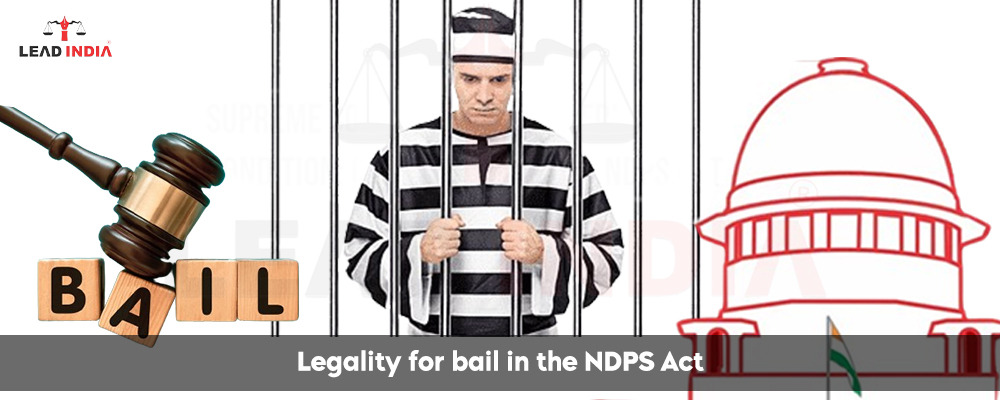The NDPS Act was adopted to unify and revise narcotic drug laws, as well as to make rigorous provisions for the control and regulation of Narcotic Drugs and Psychotropic Substances operations. The act forbids the creation, manufacture, cultivation, possession, sale, transportation, purchase, and consumption of narcotic drugs and psychotropic substances.
However, as time passed and the field of illicit drug traffic and drug misuse evolved, several flaws in the current rules became apparent, particularly in sections concerning bail (sp. 37) and the admissibility of the Accused’s confession (sec. 67).
Need A Legal Advice
The internet is not a lawyer and neither are you. Talk to a real lawyer about your legal issue

Legal Provisions
A review of Section 37 of the NDPS Act reveals that it begins with a non-obstante clause stating that, notwithstanding anything in the Code of Criminal Procedure, 1973, no person accused of an offense prescribed therein shall be released on bail unless the conditions contained therein are met. Before granting bail, both grounds must be satisfied.
The Public Prosecutor must be allowed to oppose the application for release. If the Public Prosecutor opposes, the court must be satisfied that there are reasonable grounds to believe that the accused is not guilty and unlikely to commit an offense while on bail.
However, sub-section (3) of Section 36-A of the Act has no effect on the High Court’s exceptional bail powers under Section 439 of the Code of Criminal Procedure. For acts punished under Section 37 of the Act, the Court’s discretionary power to order a person’s release is more stringent and must be exercised with caution, as opposed to ordering a person’s release on bail under Section 439 of the Cr.P.C.
Release under the NDPS Act is based on requirements specified in Section 37 of the Act, as well as other factors, including the most important consideration, such as whether the accused will run from court or seek to tamper with the prosecution evidence. The discretionary power provided by Section 439 of the CrPC is subject to the constraints established by Section 37 of the NDPS Act.
Bail in the NDPS Act
- State of Kerala v. Rajesh (2020): In Criminal Appeal No(s). 154157 of 2020, the Apex Court declared that the notion “Reasonable Grounds” incorporates substantial probable cause reasons to assume that the accused will not be found guilty of any violation under the Act. In this instance, it was clarified that the facts of the case should be clear to remove any doubt about whether the accused committed the offense.
- Municipal Corporation of Greater Mumbai v. Kamla Mills Ltd., (2003) 6 SCC 315: The Court determined that the phrase ‘reasonable ground’ meant “by reason”. The facts of the case will determine whether or not the accused person’s deed was reasonable. After careful analysis of the circumstances, the courts must render a sensible decision.
- Union of India v. Mohd. Yusuf (2011): The court emphasized that bail should not be granted outright but should be assessed on an individual basis.
- State of Punjab v. Balbir Singh (2017): The court stated that bail should be granted in circumstances where there is no prima facie evidence of direct involvement in narcotics trafficking.
- P. Chidambaram v. Directorate of Enforcement (2020): The court emphasized that bail should not be granted only based on the nature of the offense.
- In Tofan Singh v. State of Tamil Nadu (2013), 16 SCC 31, Justices Nariman and Navin Sinha of the Supreme Court ruled that comments/confessions made under the NDPS Act cannot be used as confessional statements. It emphasized that “holding as the basis for convicting a person would be a blatant breach” of constitutional guarantees.”
- Union of India v. Niyazuddin & Anr. (2018) 13 SCC 738- In the case, the Supreme Court held that the court must first meet the twin conditions mentioned in Section 37 of the NDPS Act, as well as the parameters provided by the CrPC and other legislations. It further clarified that if the requirements of the NDPS Act and the CrPC overlap (i.e., Sections 37 and 437), the former must take precedence.
Lead India offers free legal advice and online information, in addition to other legal services. We provide a forum to speak with a lawyer and ask legal questions. Lead India’s solicitors can help you with any legal difficulties. Lead India’s solicitors may assist you with any legal issues. Lead India also provides free online legal help in India. In addition to giving online legal assistance, Lead India allows users to ask specialist questions for free.





 Talk to a Lawyer
Talk to a Lawyer